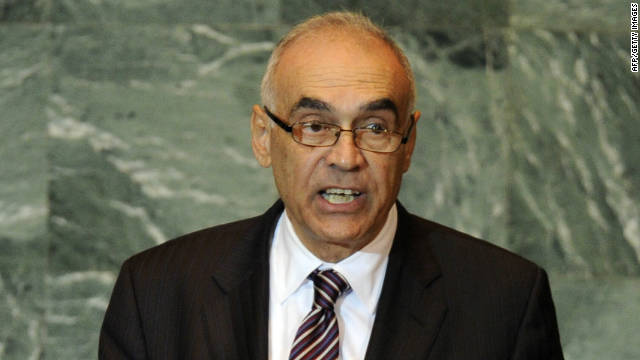 |
| Egypt's Foreign Minister Mohamed Kamel Amr addresses the the United Nations in New York on September 24 |
From Libya, the executive chairman of the country's transitional council formally addressed the assembly's 66th annual session, saying his country was ready to "redevelop itself" and "heal its wounds."
Mahmoud Jibril also called for a thaw of Libyan financial assets, frozen during the ongoing conflict between pro and anti-Gadhafi forces.
Col. Moammar Gadhafi -- who ruled Libya with near absolute power for more than four decades -- fled from office last month, although pockets of resistance have remained.
Jibril's speech was in stark contrast to a rambling 90-minute address given by the former Libyan leader two years ago in which he criticized the United Nations and the composition of its security council.
From Egypt, Foreign Minister Mohamed Kamel Amr also addressed the assembly -- the first time an Egyptian delegate has done so representing a post- Mubarak government.
Long-time strongman and former Egyptian President Hosni Mubarak stepped down in February, handing over power to the military and ending three decades of iron-clad rule following an 18-day popular revolution.
In a move that seemed to punctuate recent tensions between Egypt and Israel (rioters stormed the Israeli embassy in Cairo earlier this month) the country's foreign minister told delegates that Egypt is supportive of a Palestinian U.N. bid for statehood.
He added that the Quartet -- representatives from the U.S., the U.N., Russia and the European Union -- had failed "to come up with a balanced vision."
The first week of U.N. debates wrapped up on Saturday as delegates outlined their visions for peace and global security.
But one topic remained at the forefront of the annual session: The bid for Palestinian statehood.
On Friday, Palestinian President Mahmoud Abbas put forth a historic request for full U.N. membership, a move Israel says is premature without direct talks that address its longstanding security concerns.
The measure prompted the Quartet to issue a call for renewed talks, after they broke down last year.
Their statement Friday outlined a timetable for an Israeli-Palestinian peace agreement to be reached before the end of 2012, countering any anticipation of immediate change in the region.
Abbas told reporters traveling with him Saturday that he would not comment on the Quartet statement before studying it, according to WAFA, the Palestinian Authority news agency. But he added that any proposal that did not include an end to settlement activities and a return to the 1967 borders would not be dealt with.
He said there were many last-minute meetings on the sidelines of the U.N. General Assembly, with diplomats seeking to persuade him to give up his request for Palestinian statehood.
"All these meeting, which were confusing, did not make us change our position because our goal was to deliver the official and humanitarian Palestinian message," Abbas said.
Abbas' application -- viewed as a largely symbolic gesture because an American veto is all but assured should it come to a vote in the Security Council -- drew applause in the assembly when the Palestinian leader raised the document at the podium.
"Peace will not come through statements and resolutions at the U.N.," U.S. President Barack Obama said in a speech to delegates at the General Assembly earlier this week. "If it were that easy, it would have been accomplished by now."
The American president said he supports Palestinian statehood, but reiterated a long-standing U.S. position that Israel must be part of the discussions.
Israel has described the bid as counterproductive, and has called for an immediate resumption of talks to begin in New York and to be continued in Ramallah and Jerusalem.
The Security Council is expected to meet Monday to further discuss the issue.
Also Saturday, the international body hosted a mini-summit on drought and famine in the Horn of Africa. U.N. Secretary-General Ban Ki-moon said more than 13 million people in Ethiopia, Kenya, Somalia and Djibouti "need our help."
He said three-quarters of a million people are "at imminent risk of starvation" as a result of war, rising food costs and droughts that have continually plagued the region.
The mini-summit coincided with a World Bank decision in Washington to boost aid to the region to $1.88 billion from more than $500 million, the D.C.-based financial institution announced Saturday.
No comments:
Post a Comment